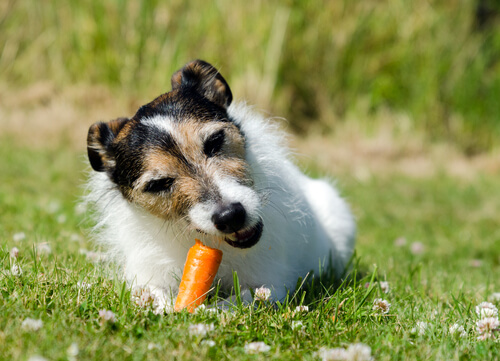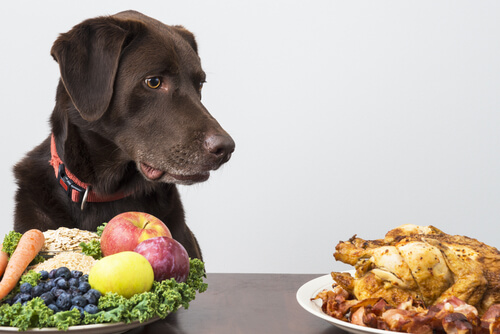What Are the Benefits of Carrots for Dogs?


Written and verified by the biologist Cesar Paul Gonzalez Gonzalez
A pet’s diet has a great impact on their health. For this reason, some owners choose to vary their dogs’ food and include some fresh vegetables that give them several benefits, such as carrots, lettuce, and broccoli.
Carrots are known as one of the most beneficial foods for human and dog health. This is thanks to the fact that they contain a vast variety of nutrients that are useful for our metabolism. Read on and find out more about the health benefits of carrots for dogs.
What are the benefits of carrots for dogs?
The humble carrot (Daucus carota sativus) is a plant species known for producing thickened and elongated orange roots. This is because the plant stores a good amount of nutrients and vitamins in the root, which ends up increasing its size and making it fleshy.
The most important components of the carrot are carbohydrates, carotenoids, and vitamin A. These are the most important ones, and are the ones that give it that “sweet” taste when eaten, and also cause the orange coloration that’s typical of this vegetable.
The carotenoids and vitamin A produce the health benefits, as these molecules are actively involved in a dog’s metabolism. For this reason, the adequate consumption of carrots could benefit a dog’s health in the following ways:
- Improving energy performance: Carbohydrates are the main source of energy in metabolism.
- Protecting eye health: Vitamin A serves as an essential element for the production of photoreceptors (which are responsible for interpreting visual stimuli).
- Improving digestion: All vegetables contain fiber, which aids intestinal transit and nutrient absorption.
- Reducing dental tartar: The hardness of carrots also serves as an abrasive that cleans dogs’ teeth.
- Keeping skin and mucous membranes in good condition: Carotenes have an antioxidant and protective function, so they’re very useful in the epidermis and mucous membranes.
- Strengthening the immune system: According to an article in the Journal of Veterinary Internal Medicine article, the consumption of carotenoids improves the body’s immune response.

How to give carrots to dogs
Although carrots can be eaten raw, it’s best to give them to dogs boiled and in small pieces. This not only makes it more palatable, but also facilitates its digestion and releases nutrients more easily. In addition, the cooking process eliminates bacteria and some parasites that could infect the pet.
This doesn’t imply that it’s bad to give raw carrots to a dog. In fact, some owners choose to do so, because the hardness of the vegetable creates the abrasive effect that cleans its teeth. However, it’s crucial to clean the food well and disinfect it in order to eliminate residual pathogens from its cultivation.
You should avoid mixing any natural food with their regular feed, as the digestion process is different for both foods. Preferably, calculate an interval of at least 7 hours between one and the other. This way you’ll prevent digestive problems and your pet will enjoy the individual rations more.
Ideal portions
As with all foods, the benefits of carrot consumption only apply when they’re consumed in adequate portions. The biggest problem with this vegetable is its carbohydrate content, which in excess could cause health problems and even obesity.
The amount of carrot offered to the dog should be very controlled and monitored. Apart from the fact that it could cause health conflicts, not all dogs digest it well. Therefore, the ration depends on the animal’s taste, tolerance and size. In general, an adequate consumption should be 20 grams per 10 kilograms of weight, but it can be increased or decreased as required.
If carrots are consumed in excess, dogs could suffer from carotenemia due to the excess of carotenes in their bodies. This condition isn’t usually serious or risky, but it has a negative impact on the liver and could facilitate the presence of other pathologies in this organ.

Beware of food allergies
Unfortunately, fresh foods aren’t suitable for all dogs, as some of them suffer from allergic reactions when consuming them. In fact, it’s estimated that 10-15% of the world’s canine population suffers from food allergies. Therefore, it’s important to confirm that they won’t have problems when eating carrots.
To rule out allergies, the best option is to offer a small piece of carrot to the dog and wait a few minutes to see if it shows any of the following symptoms:
- Excessive itching (intense scratching)
- Progressive inflammation
- Difficulty in breathing
- Excessive drooling
- Vomiting
- Seizures
- Sneezing
- Eye irritation
In case one or more of these warning signs appear, go immediately to the vet’s. On the contrary, if they don’t show any adverse reaction, you can increase the ration to the amount we mentioned above. However, be very careful and keep an eye on your pet.
As you can see, carrots offer many different health benefits for dogs. However, their consumption should always be monitored and should never be excessive. Otherwise, the dog’s health could be at risk and even have long-term consequences.
A pet’s diet has a great impact on their health. For this reason, some owners choose to vary their dogs’ food and include some fresh vegetables that give them several benefits, such as carrots, lettuce, and broccoli.
Carrots are known as one of the most beneficial foods for human and dog health. This is thanks to the fact that they contain a vast variety of nutrients that are useful for our metabolism. Read on and find out more about the health benefits of carrots for dogs.
What are the benefits of carrots for dogs?
The humble carrot (Daucus carota sativus) is a plant species known for producing thickened and elongated orange roots. This is because the plant stores a good amount of nutrients and vitamins in the root, which ends up increasing its size and making it fleshy.
The most important components of the carrot are carbohydrates, carotenoids, and vitamin A. These are the most important ones, and are the ones that give it that “sweet” taste when eaten, and also cause the orange coloration that’s typical of this vegetable.
The carotenoids and vitamin A produce the health benefits, as these molecules are actively involved in a dog’s metabolism. For this reason, the adequate consumption of carrots could benefit a dog’s health in the following ways:
- Improving energy performance: Carbohydrates are the main source of energy in metabolism.
- Protecting eye health: Vitamin A serves as an essential element for the production of photoreceptors (which are responsible for interpreting visual stimuli).
- Improving digestion: All vegetables contain fiber, which aids intestinal transit and nutrient absorption.
- Reducing dental tartar: The hardness of carrots also serves as an abrasive that cleans dogs’ teeth.
- Keeping skin and mucous membranes in good condition: Carotenes have an antioxidant and protective function, so they’re very useful in the epidermis and mucous membranes.
- Strengthening the immune system: According to an article in the Journal of Veterinary Internal Medicine article, the consumption of carotenoids improves the body’s immune response.

How to give carrots to dogs
Although carrots can be eaten raw, it’s best to give them to dogs boiled and in small pieces. This not only makes it more palatable, but also facilitates its digestion and releases nutrients more easily. In addition, the cooking process eliminates bacteria and some parasites that could infect the pet.
This doesn’t imply that it’s bad to give raw carrots to a dog. In fact, some owners choose to do so, because the hardness of the vegetable creates the abrasive effect that cleans its teeth. However, it’s crucial to clean the food well and disinfect it in order to eliminate residual pathogens from its cultivation.
You should avoid mixing any natural food with their regular feed, as the digestion process is different for both foods. Preferably, calculate an interval of at least 7 hours between one and the other. This way you’ll prevent digestive problems and your pet will enjoy the individual rations more.
Ideal portions
As with all foods, the benefits of carrot consumption only apply when they’re consumed in adequate portions. The biggest problem with this vegetable is its carbohydrate content, which in excess could cause health problems and even obesity.
The amount of carrot offered to the dog should be very controlled and monitored. Apart from the fact that it could cause health conflicts, not all dogs digest it well. Therefore, the ration depends on the animal’s taste, tolerance and size. In general, an adequate consumption should be 20 grams per 10 kilograms of weight, but it can be increased or decreased as required.
If carrots are consumed in excess, dogs could suffer from carotenemia due to the excess of carotenes in their bodies. This condition isn’t usually serious or risky, but it has a negative impact on the liver and could facilitate the presence of other pathologies in this organ.

Beware of food allergies
Unfortunately, fresh foods aren’t suitable for all dogs, as some of them suffer from allergic reactions when consuming them. In fact, it’s estimated that 10-15% of the world’s canine population suffers from food allergies. Therefore, it’s important to confirm that they won’t have problems when eating carrots.
To rule out allergies, the best option is to offer a small piece of carrot to the dog and wait a few minutes to see if it shows any of the following symptoms:
- Excessive itching (intense scratching)
- Progressive inflammation
- Difficulty in breathing
- Excessive drooling
- Vomiting
- Seizures
- Sneezing
- Eye irritation
In case one or more of these warning signs appear, go immediately to the vet’s. On the contrary, if they don’t show any adverse reaction, you can increase the ration to the amount we mentioned above. However, be very careful and keep an eye on your pet.
As you can see, carrots offer many different health benefits for dogs. However, their consumption should always be monitored and should never be excessive. Otherwise, the dog’s health could be at risk and even have long-term consequences.
All cited sources were thoroughly reviewed by our team to ensure their quality, reliability, currency, and validity. The bibliography of this article was considered reliable and of academic or scientific accuracy.
- Turner, R. G. (1934). Effect of prolonged feeding of raw carrots on vitamin A content of liver and kidneys in the dog. Proceedings of the Society for Experimental Biology and Medicine, 31(7), 866-868.
- Massimino, S., Kearns, R. J., Loos, K. M., Burr, J., Park, J. S., Chew, B., … & Hayek, M. G. (2003). Effects of Age and Dietary β‐Carotene on Immunological Variables in Dogs. Journal of veterinary internal medicine, 17(6), 835-842.
- Bhagat, R., Sheikh, A. A., Wazir, V. S., Mishra, A., & Maibam, U. (2017). Food allergy in canines: A review. Journal of Entomology and Zoology Studies, 5(6), 1522-1525.
- Verlinden, A., Hesta, M., Millet, S., & Janssens, G. P. J. (2006). Food allergy in dogs and cats: a review. Critical reviews in food science and nutrition, 46(3), 259-273.
- Dopierała, Marta & Andraszek, Katarzyna. (2019). THE MOST COMMON ALLERGIC DISEASES IN DOGS. Folia Pomeranae Universitatis Technologiae Stetinensis Agricultura, Alimentaria, Piscaria et Zootechnica. 348(49)1. 47-56. 10.21005/AAPZ2019.49.1.05.
This text is provided for informational purposes only and does not replace consultation with a professional. If in doubt, consult your specialist.








